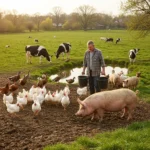10 Breeds of Cattle for Homesteading
Homesteading is a rewarding lifestyle that allows individuals and families to cultivate their own food, raise livestock, and live sustainably. Among the various livestock options, cattle are a popular choice due to their versatility, providing meat, milk, and even labor.
When selecting cattle for homesteading, it’s essential to consider factors such as climate, land availability, and the primary purpose of raising cattle. Here are ten of the best breeds for homesteading, each with unique characteristics and benefits.


Jerseys are renowned for their high milk production and rich, creamy milk, which has a high butterfat content.
They are smaller in size compared to other dairy breeds, making them easier to manage for homesteaders with limited space. Jerseys are also known for their friendly temperament, making them a great choice for families.
Angus cattle are primarily raised for beef and are known for their excellent meat quality, which is tender and marbled.
They are hardy animals that adapt well to various climates and are relatively easy to care for. Their black coats also provide some protection against sunburn, making them suitable for warmer regions.


Herefords are another popular beef breed, recognized for their distinctive white face and red body.
They are known for their docile nature and good mothering abilities, making them ideal for homesteaders looking to raise cattle for meat. Herefords are also efficient grazers, thriving on pasture-based diets.
Guernsey cattle are a dual-purpose breed, valued for both their milk and meat. They produce milk with a high butterfat content and are known for their rich flavor.
Guernseys are also hardy and adaptable, making them suitable for various climates. Their gentle disposition makes them easy to handle.


Dexters are a small breed that is perfect for homesteaders with limited space. They are dual-purpose, providing both milk and beef. Their smaller size makes them easier to manage, and they are known for their friendly nature.
Dexters are also efficient foragers, thriving on pasture and requiring less feed than larger breeds.
Belted Galloway
Often referred to as “Oreo cows” due to their distinctive black and white markings, Belted Galloways are a hardy breed known for their excellent beef quality.
They are well-suited for colder climates and are efficient grazers. Their unique appearance and friendly temperament make them a favorite among homesteaders.


Milking Shorthorns are a versatile breed that excels in both milk and meat production. They are known for their calm demeanor and adaptability to various environments.
Their milk is of good quality, and they are efficient converters of feed into meat, making them a practical choice for homesteaders.
Simmentals are one of the oldest and most widely distributed breeds in the world. They are known for their rapid growth rates and high-quality beef.
Simmentals are also good milk producers, making them a dual-purpose option for homesteaders. Their friendly nature and adaptability to different climates make them a popular choice.


Ayrshire cattle are known for their high milk production and efficient feed conversion. They are medium-sized animals with a calm temperament, making them easy to handle.
Ayrshires thrive in various climates and are known for their longevity, providing a reliable source of milk for homesteaders.
Red Poll cattle are a dual-purpose breed known for their excellent meat quality and good milk production.
They are naturally polled (without horns), making them safer for homesteaders with children. Red Polls are also known for their docile nature and adaptability, making them a great addition to any homestead.


Choosing the right breed of cattle for homesteading depends on your specific needs, available resources, and personal preferences.
Whether you are looking for high milk production, quality beef, or a friendly companion, there is a breed that fits your homesteading goals. By selecting the right cattle, you can enhance your self-sufficiency and enjoy the many benefits of raising livestock on your homestead.


